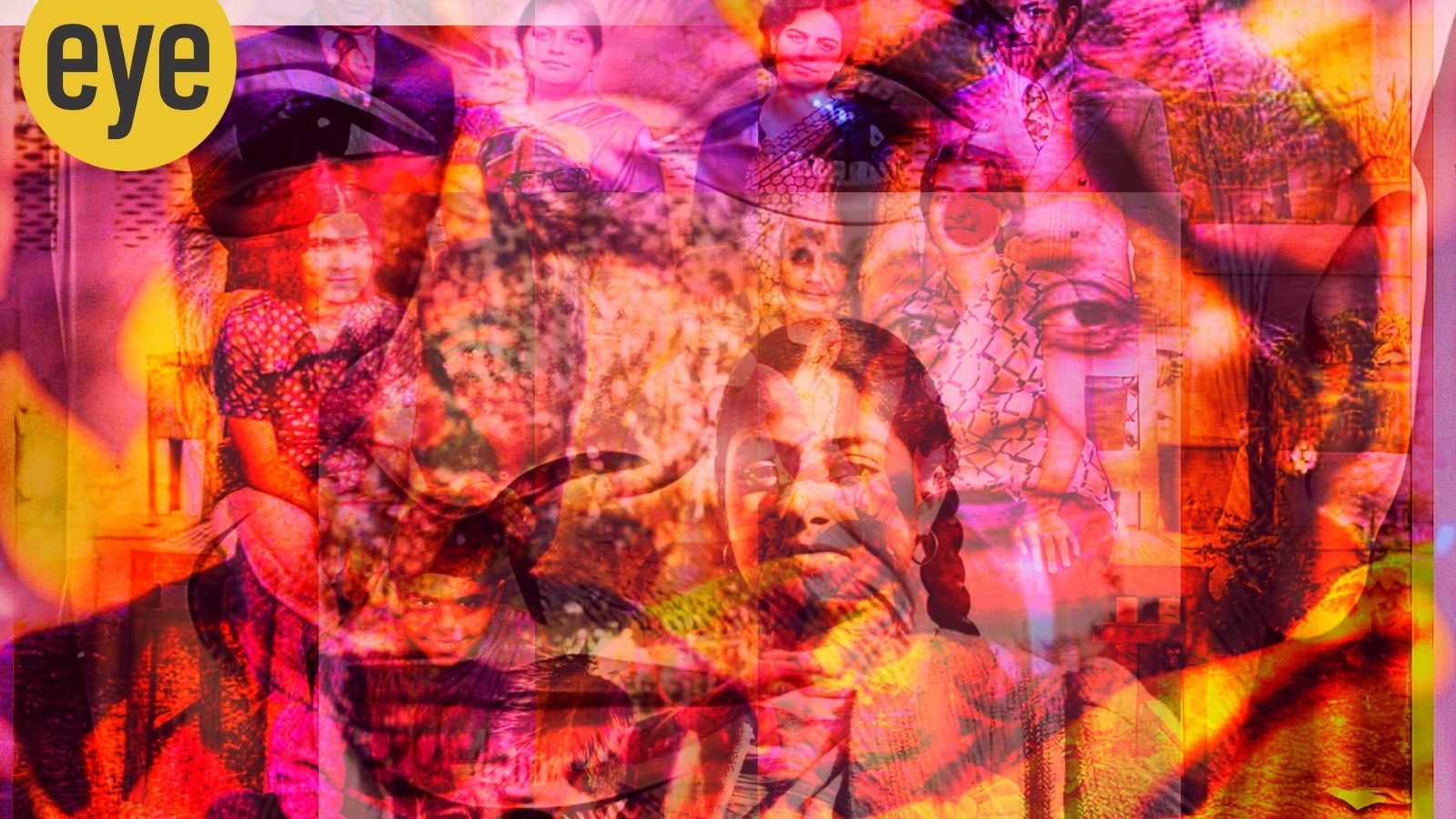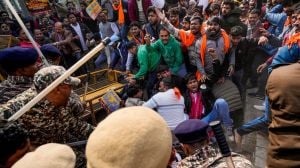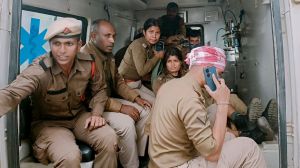‘Kahin door jab din dhal jaye’: How music, memory, and loss shape us
People speak of love as a high. But love is also a low, a longing, a lament. It is a mirror, a maze, a melody. It is the most human thing we do. And I am so grateful to be human.
 A heartfelt reflection on love, loss, and memory—told through the song Kahin Door Jab Din Dhal Jaye. (Credit: Suvir Saran)
A heartfelt reflection on love, loss, and memory—told through the song Kahin Door Jab Din Dhal Jaye. (Credit: Suvir Saran)This morning, I walked the few steps from my apartment to my mother’s, just three floors above mine. I do this often, but today, as I stepped into her fourth-floor home, it felt like entering a prayer. The living room stood hushed, bathed in a dappled light that didn’t announce itself but moved like memory—soft, golden, certain.
The sunlight slanted through the windows and came to rest upon a cluster of flowers on the table, their petals glowing as if kissed by someone long gone. You couldn’t tell if it was morning or evening. The light wore the grace of both, and perhaps that’s the truth: the rising sun and the setting sun speak in the same language of softness. If you are still enough, if your heart is listening, they sound alike—like two old friends humming the same song in different keys.
That song, for me, is Kahin Door Jab Din Dhal Jaye, sung by Mukesh, with that voice lined with longing. A song from a film I never watched and never needed to, because the song didn’t belong to a movie—it belonged to my life. It was one of my father’s favourites. He would often make me sing it—sometimes like a performance, other times like a prayer. My Bhua, my aunt Deepa—his older sister—adored it just as much. It was theirs, jointly. A lyrical lullaby that lived in our home like family.
She was Deepa. He was Deepak. Flame and light. Born of the same spark, carrying the same glow. Even their names sounded like they were meant to be said together. They were two luminous beings—siblings who lit up every room, every life, every conversation they entered. And they didn’t just shine alone; they made others glow. Their warmth wasn’t exclusive. It was generous, liberating, contagious.
This morning, standing in my mother’s living room, sipping the cold coffee she always offers me with breakfast—because I’ve never cared for tea—I was momentarily transported. The filtered light, the silence, the stillness… it all felt like dusk, even though the day had barely begun. It reminded me of Papa. Of Bhua. Of the way love lingers long after those we love have left. And of how grief and gratitude can share the same breath.
Papa left us first. We saw it coming—his liver was in its final battle—but knowing doesn’t soften the blow. A year later, Bhua followed, as though the flame could not burn alone once its twin was gone. Her passing was a bolt from the blue. No warning, no signs. One day she was tending to her garden, setting the dining table just so, or gently mentoring an underprivileged child in her living room. The next day, the world dimmed without her.
It’s a wound our family still carries—raw yet radiant. We—the children of these two luminous beings, six of us in total, alongside my mother, the quiet matriarch who remains—have had to learn to live without their physical presence. And yet, even in absence, they have become more present. They arrive in light, in scent, in song. They show up when we least expect and most need. They have become the pause in our laughter, the fullness in our silences, the sudden tears behind a smile.
Mere khayalon ke aangan mein, koi sapno ke deep jalaaye…
Yes, sometimes—without warning, without logic—a dream lights itself again. A flicker in the courtyard of my thoughts, a lamp lit by memory. I have often felt touched by something invisible, a gentle presence that tiptoes through the corridors of consciousness, lighting the unlit corners of the soul. Isn’t that what love does—even long after it’s gone? It ignites something that never quite goes out.
There have been moments when I’ve been sitting still—completely still—and my breath suddenly weighs heavier. Kabhi yun hi, jab hui bojhal saansen… bhar aayi baithe baithe jab yun hi aankhen… For no apparent reason. A song on the radio. A smell. The touch of fabric. And the eyes well up. Because grief, too, is loyal. And sometimes, love returns not as a person but as a memory masquerading as air.
I have been touched by love that never showed itself. Kabhi machal ke, pyaar se chal ke, chhuye koi mujhe, par nazar na aaye… I have felt the warmth of a soul leaning into mine, though the body never turned to face me. I have felt eyes on my back when no one was there. I have known kisses in my sleep and woken up feeling both full and hollow. There is a love that visits us only through dreams and never dares the daylight. And even that is a kind of gift.
What is it about longing that leaves us so alive? Why does unrequited love sometimes shine brighter in our story than the one that stayed?
Kahin to yeh dil kabhi mil nahin paate… kahin pe nikal aaye janmon ke naate…
Perhaps some hearts are never meant to meet fully in this life. Some souls circle each other like satellites, their gravity undeniable, their fate always slightly misaligned. And yet—somewhere in that almost, something eternal is born. Love that escapes fulfilment finds its permanence in longing.
And the mind, the betrayer, the bearer of confusion—it resists this surrender. Thami thi uljhan, bairi apna man… The battle has always been with myself. Wanting love, fearing it. Craving intimacy, sabotaging it. Hoping for answers, dreading the truth. And yet, even in the chaos, even in the collapse, I have been capable of loving again.
Apna hi hoke, sahe dard paraaye…
How many times have we borne the weight of someone else’s sorrow, even as we staggered beneath our own? How often have we been the keeper of another’s pain—the listener, the absorber, the one who doesn’t flinch while bleeding silently?
I’ve known love that made me feel like light. I’ve also known love that reduced me to ashes. I have lusted for connection, only to find myself left hollow. I have offered my heart wrapped in velvet and had it returned in pieces. And still, I do not regret a single sigh. Because every crack is an opening. Every scar is a testament. Every heartbreak has been a hymn.
People speak of love as a high. But love is also a low, a longing, a lament. It is a mirror, a maze, a melody. It is the most human thing we do. And I am so grateful to be human.
This morning, the sun made no distinction between memory and light. It just poured in. And in that glow, I saw them both. Papa, in his quiet wisdom. Bhua, in her effortless grace. I saw the flicker of every memory—their voices, their laughter, their protective warmth, their unwavering belief in the goodness of people. I didn’t cry. I smiled. The kind of smile that trembles at the corners. The kind of smile you give to ghosts you love.
And I realised, once again, how lucky we are to miss people. To have been marked by someone so deeply that their absence feels like a presence. It is a privilege to mourn. It means you once belonged.
And so, I sing.
Because I have lived. Because I have loved. Because I have lost.
And still, I dare to sing.
- 01
- 02
- 03
- 04
- 05































